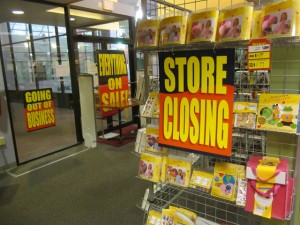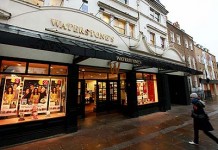 I’d bookmarked several articles this week waxing philosophical about the fate of the bookstore, and it seems I am not the only one who noticed this trend: Laura Hazard Owen did a nice round-up for GigaOM summarizing the contributions from some main players.
I’d bookmarked several articles this week waxing philosophical about the fate of the bookstore, and it seems I am not the only one who noticed this trend: Laura Hazard Owen did a nice round-up for GigaOM summarizing the contributions from some main players.
Joseph Esposito, Mike Shatzkin and Seth Godin all approach the book issue from different vantage points (Esposito and Shatzkin are cunsultants, Godin is an author) but reach a few similar conclusions, about the move to e-books (inevitable, whether welcome or not) and the shift to purchasing online versus purchasing in stores. Godin seems a little more sentimental and hopes that the indie stores can make themselves relevant as community hubs and gift vendors.
But what all three of these articles missed is, for me, what turns out to be the central argument in this whole debate. The bookstores will fail not because of books but because of customers. And it’s the publishers they can blame for poaching them away.
Let me explain further.
Under the old ecosystem, the supply chain was clear: Publishers sold to the distributors, distributors sold to the bookstores, and then bookstores sold to the customers. And now? Publishers are struggling with a model where they at times have to deal with the customers directly. And in some cases, authors are selling to people directly without any middlemen at all!
We’ve been going through some Business 101 in my house lately because someone we know is starting a business, and one of the first questions we talked about was ‘Who is your ideal customer?’ If you can’t answer that question clearly, you won’t know who to market to, and you won’t know how to get that person snared in. This is the problem bookstores are having. The publishers are increasingly marketing to the reader directly. So where does that leave the bookstore now? In this new scenario, who, exactly, is their ideal customer?

































The role of the bookstore is that of the old style librarian of the turn of the previous century.
Bookstores can continue to make money and provide a valuable way of getting to books/materials by thinking of themselves as ‘knowledge guides” either tight or wide focused. They find the materials you want and sell them to you.
We currently pay for library access almost everywhere in the US at least indirectly and many Countries it is a direct up front fee that prevents easy access.
Bookstores can become for profit libraries and continue to exist.
Bookstores need to be consultants to their customers. Customers need to rely on their bookstore as a specialist in acquiring the best selection of books for their customers. Authors should work with bookstores on an exclusive basis with no publisher involved. Think of books as art. Just dreaming… 🙂
Bookstores should never feel threatened; they are right where they have always been; in the middle of things. They give all of us a place to escape to; a different kind of world that’s real in its own way. They give the world a feeling of community where people who want to turn the pages can gather. The bookstore, simply put, is where books and humans come together; it’s an author’s hangout in an author’s world. If anyone values the feel of something that’s been around since the dawn of time, then you understand what I’m talking about. The bookstore simply needs to beef up their own marketing and advertising without getting carried away. Just something to think about.